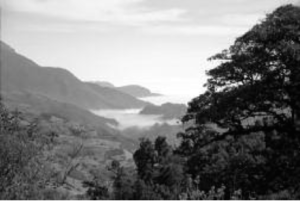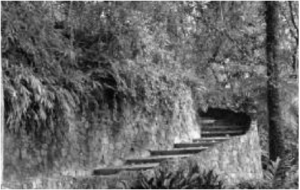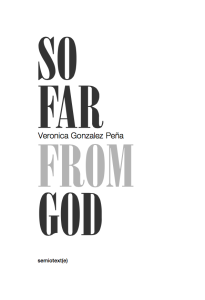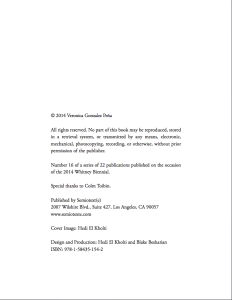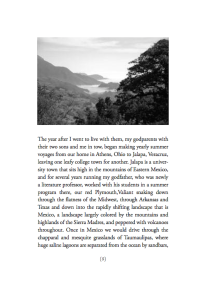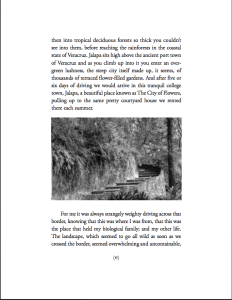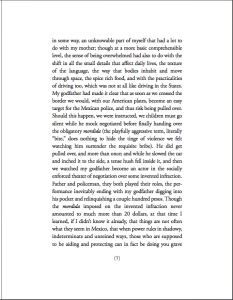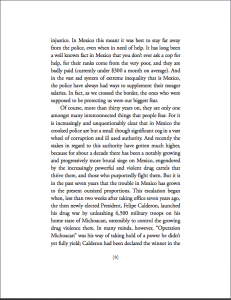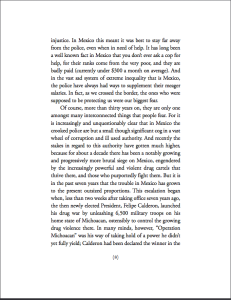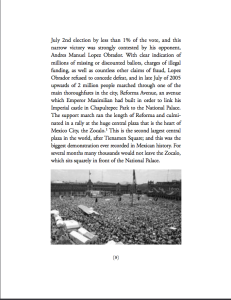So Far From God Excerpt
The year after I went to live with them, my godparents with their two sons and me in tow, began making yearly summer voyages from our home in Athens, Ohio to Jalapa, Veracruz, leaving one leafy college town for another. Jalapa is a univer- sity town that sits high in the mountains of Eastern Mexico, and for several years running my godfather, who was newly a literature professor, worked with his students in a summer program there, our red Plymouth,Valiant snaking down through the flatness of the Midwest, through Arkansas and Texas and down into the rapidly shifting landscape that is Mexico, a landscape largely colored by the mountains and highlands of the Sierra Madres, and peppered with volcanoes throughout. Once in Mexico we would drive through the chapparal and mesquite grasslands of Taumaulipas, where huge saline lagoons are separated from the ocean by sandbars, then into tropical deciduous forests so thick you couldn’t see into them, before reaching the rainforests in the coastal state of Veracruz. Jalapa sits high above the ancient port town of Veracruz and as you climb up into it you enter an ever- green lushness, the steep city itself made up, it seems, of thousands of terraced flower-filled gardens. And after five or six days of driving we would arrive in this tranquil college town, Jalapa, a beautiful place known as The City of Flowers, pulling up to the same pretty courtyard house we rented there each summer.
For me it was always strangely weighty driving across that border, knowing that this was where I was from, that this was the place that held my biological family; and my other life. The landscape, which seemed to go all wild as soon as we crossed the border, seemed overwhelming and uncontainable, in some way, an unknowable part of myself that had a lot to do with my mother; though at a more basic comprehensible level, the sense of being overwhelmed had also to do with the shift in all the small details that affect daily lives, the texture of the language, the way that bodies inhabit and move through space, the spice rich food, and with the practicalities of driving too, which was not at all like driving in the States. My godfather had made it clear that as soon as we crossed the border we would, with our American plates, become an easy target for the Mexican police, and thus risk being pulled over. Should this happen, we were instructed, we children must go silent while he mock negotiated before finally handing over the obligatory mordida (the playfully aggressive term, literally “bite,” does nothing to hide the tinge of violence we felt watching him surrender the requisite bribe). He did get pulled over, and more than once; and while he slowed the car and inched it to the side, a tense hush fell inside it, and then we watched my godfather become an actor in the socially enforced theater of negotiation over some invented infraction. Father and policeman, they both played their roles, the per- formance inevitably ending with my godfather digging into his pocket and relinquishing a couple hundred pesos. Though the mordida imposed on the invented infraction never amounted to much more than 20 dollars, at that time I learned, if I didn’t know it already, that things are not often what they seem in Mexico, that when power rules in shadowy, indeterminate and unreined ways, those who are supposed to be aiding and protecting can in fact be doing you grave injustice. In Mexico this meant it was best to stay far away from the police, even when in need of help. It has long been a well known fact in Mexico that you don’t ever ask a cop for help, for their ranks come from the very poor, and they are badly paid (currently under $300 a month on average). And in the vast sad system of extreme inequality that is Mexico, the police have always had ways to supplement their meager salaries. In fact, as we crossed the border, the ones who were supposed to be protecting us were our biggest fear.
Of course, more than thirty years on, they are only one amongst many interconnected things that people fear. For it is increasingly and unquestionably clear that in Mexico the crooked police are but a small though significant cog in a vast wheel of corruption and ill used authority. And recently the stakes in regard to this authority have gotten much higher, because for about a decade there has been a notably growing and progressively more brutal siege on Mexico, engendered by the increasingly powerful and violent drug cartels that thrive there, and those who purportedly fight them. But it is in the past seven years that the trouble in Mexico has grown to the present outsized proportions. This escalation began when, less than two weeks after taking office seven years ago, the then newly elected President, Felipe Calderon, launched his drug war by unleashing 6,500 military troops on his home state of Michoacan, ostensibly to control the growing drug violence there. In many minds, however, “Operation Michoacan” was his way of taking hold of a power he didn’t yet fully yield; Calderon had been declared the winner in the July 2nd election by less than 1% of the vote, and this narrow victory was strongly contested by his opponent, Andres Manuel Lopez Obrador. With clear indication of millions of missing or discounted ballots, charges of illegal funding, as well as countless other claims of fraud, Lopez Obrador refused to concede defeat, and in late July of 2005 upwards of 2 million people marched through one of the main thoroughfares in the city, Reforma Avenue, an avenue which Emperor Maximilian had built in order to link his Imperial castle in Chapultepec Park to the National Palace. The support march ran the length of Reforma and culmi- nated in a rally at the huge central plaza that is the heart of Mexico City, the Zocalo.1 This is the second largest central plaza in the world, after Tienamen Square; and this was the biggest demonstration ever recorded in Mexican history. For several months many thousands would not leave the Zocalo, which sits squarely in front of the National Palace.


